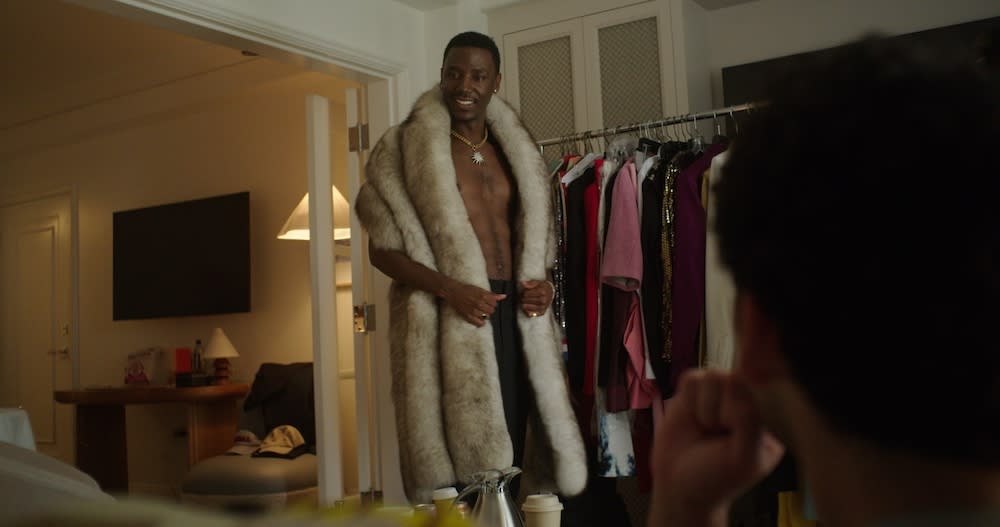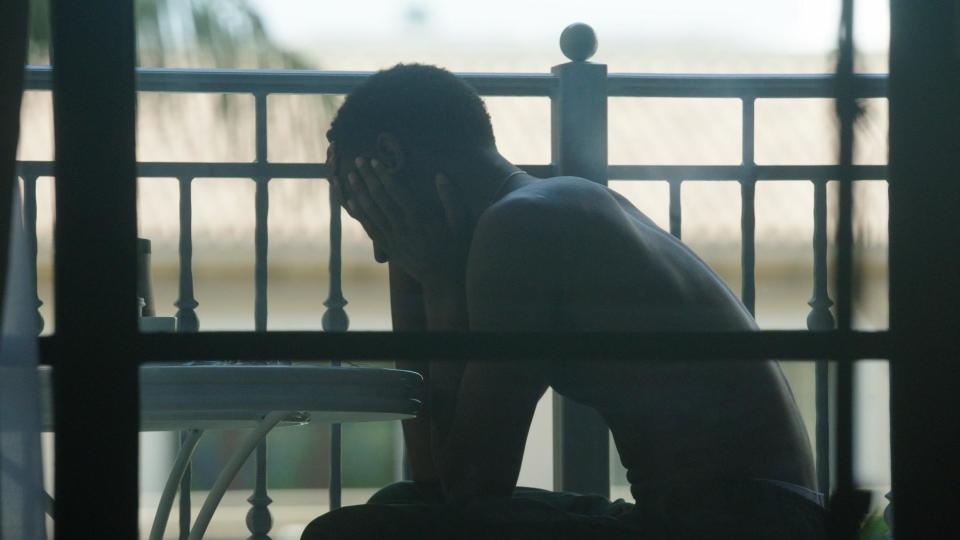‘Jerrod Carmichael Reality Show’ Is a Bravura Vanity Project That Gives More than It Gets

- Oops!Something went wrong.Please try again later.

Jerrod Carmichael has a problem. “I didn’t know it was a problem,” he says during his new HBO series, “Jerrod Carmichael Reality Show.” But recent events have made it clear that it is, in fact, a problem. A big one. What is it? “I only like to do exactly what I want to do.”
You may be thinking, “Wait, what’s wrong with that? Don’t we all only like doing what we want?” Sure we do. Except, not really, and not in the way Carmichael means here. He’s saying he doesn’t like doing things for other people. Like, at all. He doesn’t want to drive you to the airport. He doesn’t want to let you crash at his place for a few weeks. He doesn’t want to do the things friends are expected to do simply because it helps someone they care about. Part documentary, part diary, “Reality Show” provides examples that take our protagonist’s position even further, from “Jerrod doesn’t like doing this” to “Jerrod won’t do this.” He chooses what to do (and what not to do) for his friends’ birthdays. He ghosts friends who he doesn’t want to talk to (for weeks, if not longer). His behavior at a wedding — where he’s the best man — is, quite frankly, unfathomable.
More from IndieWire
'Fraggle Rock: Back to the Rock' Relied on a 'Fraggle Gaggle' of Voices to Revive Beloved Series
Science Be Damned - '3 Body Problem' Just Wanted Its VR Game to 'Look Cool'
But, as the poets say, the first step in solving a problem is recognizing there is one, and Carmichael spends most of the eight-episode series trying to fix his problem. “Reality Show” is ostensibly about the comedian behind “Rothaniel” (and “The Carmichael Show,” “8,” “On the Count of Three,” and so much more) growing as a man while healing his old relationships, primarily with his parents. In that sense, it functions as a revealing follow-up to his Emmy-winning HBO special, exploring his father’s infidelity and mother’s homophobia — only this time, with both of them on camera, speaking for themselves, often during immensely difficult conversations orchestrated by their son.
Still, “Reality Show” isn’t just an expansion on his stand-up set. It isn’t just a vanity project either, although it is a vanity project — an extended therapy session made up of many actual therapy sessions. Carmichael’s problem is both specifically his and universally ours. Rather than feel like an exhaustive exploration of the famous auteur’s own asshole, its consistent, clever comedy, pristine episodic structure, and unfailing self-awareness (which, yes, can skew narcissistic) keep “Reality Show” on the right side of the relatable/alienating divide. The skin-crawling interpersonal splits may go to extremes, they may even feel engineered, but they’re all in service of a story that never loses its grip on humanity.
“Reality Show,” at its core, is about Carmichael’s unrequited love — the love his mother stopped returning, the love he’s seeking but isn’t enough, and the love he can’t give to himself. It’s a love story, and whether it’s paternal or romantic, platonic or egocentric, this love story is hard to shake.
How fitting then, that the series starts with Carmichael onstage, telling the audience, “I fell in love with my best friend. One out of 10 — do not recommend.” The first episode revolves around that opening confession, linking one fractured relationship with another: that of Jerrod and his mother, Cynthia. Carmichael is afraid his best friend won’t love him back if he tells him how he feels, which is exactly what happened with his mom, who’s drifted out of his life since he came out to her. Future episodes keep up the parallels, as Carmichael finds a boyfriend who loves him, and the comedian has to confront new issues — cheating, jealousy, judgement — many of which, to Jerrod, are rooted in what he saw in his parents’ flawed marriage. So he calls them, visits them, and pushes them to talk about their past, so he can shape a better present.

It’s not always a flattering vision. “Reality Show” sees Carmichael dig and dig and dig, confronting his own demons with the same persistence he brings to his closed-off family members. The effect can be alienating — like with his friend’s wedding — but it’s also endearing. Carmichael’s emotional intelligence paired with a warts-and-all storytelling approach (he calls it “radical honesty”) makes Carmichael uniquely identifiable, and gives the series significance beyond the subject’s self-discovery.
Rarely is that more apparent than when the focus shifts to supporting players, like when his childhood friend Jessica moves to town or in the standout episode “Jamar,” which follows Jerrod and his tour-mate, Jamar Neighbors, as the former pushes the latter to adopt a more personal approach in his stand-up. Jerrod wants Jamar to reflect on his childhood — to explore painful issues, with an audience, like Jerrod does — but the fun-loving comic struggles to adopt his friend’s style. Among the many questions brought up in the 29-minute episode (from “What do audiences deserve from today’s stand-up comics?” to “Holy shit, flying kites is fun — should I start flying kites again?”), the one that lingers is, “Why is Jerrod doing this?” Would Jamar and his comedy really benefit from being more like Jerrod, or is Jerrod still just thinking about himself when giving out advice to his friends?
The series handles serious issues with appropriate deference, but “Reality Show” is also very, very funny. Even the opening line, where Carmichael confesses to falling in love with his straight, male, best friend, has an amazing punchline. Long a brilliant conversationalist who can craft a meticulous routine and deliver it with casual charisma, Carmichael leans on segments from his stand-up sets as a kind of narration. Some bits clarify how he felt during a previous scene, while others provide a thematic backbone for the episodes. Yet when it comes to the show’s intentions, the most clarifying presence is almost completely incognito.
Early on, a close friend of Carmichael’s shows up wearing a black ski mask and goggles. His voice is distorted, and throughout the series he’s only identified as Anonymous. “Dude, this is not a neutral eye,” Anonymous says, pointing to the cameras recording their conversation. “This is not truth. This is narrative. It will be edited by someone where the editing will all be choices. That’s not truth, and I have no access to that, so fuck that. You don’t get any of me.” Carmichael then tries to explain why he’s making the show this way — “I’m trying to ‘Truman Show’ myself” — to which Anonymous responds, “It’s exhibitionist. […] There’s public and private, and then there’s masturbatorily public.”
Anonymous resurfaces from time to time in “Reality Show,” often discussing the filming process or reacting to footage he’s shown. Very light sleuthing all but confirms his identity, but who he is matters less than the purpose he serves. As if the consistent shots of crew members setting up and interacting with friends and family before, during, and after each “scene” aren’t clear enough, Carmichael wants the audience to know that his reality show isn’t exactly real. It’s a story. It’s a perspective, and it’s very clearly his perspective. His vulnerability lends it added veracity, but he’s aware of his own limitations. Sure, he’ll take a detour to share the spotlight with Jessica and Jamar — he even includes footage from his boyfriend’s one-on-one therapy sessions when Jerrod isn’t there — but it all, in some way, relates back to our protagonist’s quest to solve his problem. He wants to love and be loved in return, without losing himself in the process. After all, he just came out. He’s 35 years old, but as a gay man, he says, “I’m only 17.” (There’s a generational aspect to Carmichael’s set-up — how much he needs the camera to open up and how much more resistant his parents are to speaking when the cameras are rolling — but that’s a better discussion once a few episodes are out.)
The more you read “Reality Show” as self-obsession, the more likely you are to pull away. But if you watch it as a TV show, as a vulnerable story crafted by a master storyteller, the more likely you’ll be to come away with meaningful truths. Carmichael’s problem runs deep. But it’s easy to reach, so long as you’re willing to dig.
Grade: A-
“Jerrod Carmichael Reality Show” premieres Friday, March 29 at 11 p.m. ET on HBO. New episodes will be released weekly.
Best of IndieWire
Sign up for Indiewire's Newsletter. For the latest news, follow us on Facebook, Twitter, and Instagram.

